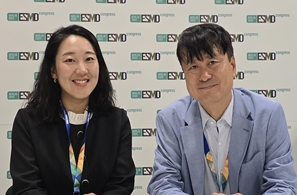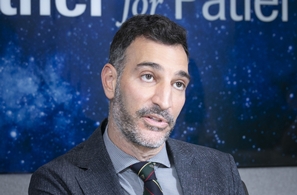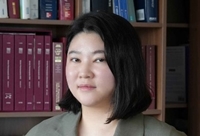- "Paradigm shift in follicular lymphoma treatment: CAR-T"
- by Whang, byung-woo | translator Hong, Ji Yeon | Feb 13, 2025 05:58am
As various treatment options are introduced to treat relapsed/refractory follicular lymphoma (FL) with a poor prognosis, how these treatments can be utilized is of great interest.
In South Korea, Kymriah (tisagenlecleucel), which is known as the chief CAR-T therapy, was approved for expanded indications in 2023 to treat patients with relapsed/refractory FL who had previously undergone two or more treatments. After that, doctors are gaining treatment experiences with the drug.
Follicular lymphoma (hereafter, FL) is a type of non-Hodgkin Lymphoma (NHL) that occurs when cells in the lymph system turn malignant. Because the symptoms of the disease progress slowly, about 80% of the cases are identified at stage III or Stage IV after the disease progresses. The prognosis for patients who relapse is poor.
Dr. Schuster said, "The prevalence of FL seems to be increasing in Asia." He added, "As FL progresses in various ways, clinical characteristics significantly vary by patient."
Dr. Schuster explains that considering the characteristics of FL, characterized by low-risk disease cases and slow disease progression, most diseases can be managed through proactive treatments. The disease becomes problematic if a disease has a poor prognosis requiring more than one treatment due to relapses.
According to Dr. Schuster, data from patients with FL who need more than one treatment indicate that the remission period shortens as patients repeatedly receive treatment.
"About 20% of the patients with FL relapse after two years following the initial treatment. Even after further treatment, the remission period shortens, and patients have a poor prognosis, thereby needing strong treatments, including CAR-T cell therapy," Dr. Schuster said. "Despite increased overall survival, patients repeatedly need treatments, and the disease can become fatal, ultimately leading to death."
There are several treatment options for FL, but Dr. Schuster highlights the clinical benefits of CAR-T cell therapy because CAR-T cell therapy does not require further treatment after the initial therapy.
The clinical effect of Kymriah (tisagenlecleucel) has been proven through the ELARA clinical study regarding relapsed/refractory FL. The four-year long-term follow-up results of the study were presented at the American Society of Hematology (ASH) conference held in December 2024.
The four-year long-term assessment results of the ELARA study (median follow-up period at 53 months) showed that patients with relapsed/refractory FL treated with Kymriah had consistent treatment response over 4 years and a favorable safety profile.
The median progression-free survival (PFS) of all patients was 53.3 months. At 48 months, 50% PFS was reported in all patients, and 66% of patients were reported to have gained complete remission (CR).
"The follow-up on patients who participated in the 2014 study has been about 10 years, and the data indicate that the overall response rate (ORR) is about 80%, similar to the recently presented ELARA clinical study result," Dr. Schuster said. "In contrast to FL requiring repeated blood tests, various scans, and drug administration for additional therapy, CAR-T cell therapy can lessen the physical and mental burden."
Will the introduction of bispecific antibody change the treatment paradigm?..."CAR-T cell therapy's advantage"
Kymriah received expanded indication in April 2023 in South Korea to treat FL, broadening treatment options.
(모네투주맙)However, there are even more options available at clinical practices. For instance, the bispecific antibody Lunsumio (mosunetuzumab) has been introduced.
Regarding this, Dr. Schuster acknowledges the role of bispecific antibodies but favors CAR-T cell therapy, which demonstrates positive long-term results over 10 years.
"Each CAR-T cell therapy and bispecific antibody has an advantage, and there are no concrete answers to the treatment sequence. The CAR-T data demonstrating positive results over 10 years in 60% of patients is unbeatable," Dr. Schuster said.
In particular, Dr. Schuster highlights that antigen can be easily lost during the treatment course of bispecific treatments, like MabThera or mosunetuzumab, that target CD20.
"The biopsy results from patients treated with bispecific antibody drugs showed that 5.5-6% of patients had losses of CD20. However, CD19-targeting CAR-T cell therapy rarely led to losses of CD19," Dr. Schuster remarked.
Dr. Schuster views that bispecific antibody drugs are important but may not replace CAR-T cell therapy. Long-term follow-up data on the remission period and response rate are needed for bispecific antibody treatment outcomes.
Dr. Schuster mentions that drug tolerance is an advantage for Kymriah.
The most common adverse event (AE) of CAR-T cell therapy is cytokine release syndrome (CRS). Kymriah has a relatively low AE rate and low severity.
Dr. Schuster also emphasized, "In the past, there have been cases where FL patients received therapies repeatedly, but ultimately, the disease led to death. However, Kymriah offers a single treatment that can help maintain a remission state. It is also a cost-effective treatment option compared to previous therapies."
Lastly, Dr. Schuster said, "Even if FL patients experience relapse after treatments, they may receive CAR-T cell therapy and maintain remission state for about 10 years, as well as having improved quality of life." He added, "Because an index for predicting survival varies by disease and disease shows characteristics, making a treatment choice through clinical follow-up assessment is important."
-

- 0
댓글 운영방식은
댓글은 실명게재와 익명게재 방식이 있으며, 실명은 이름과 아이디가 노출됩니다. 익명은 필명으로 등록 가능하며, 대댓글은 익명으로 등록 가능합니다.
댓글 노출방식은
댓글 명예자문위원(팜-코니언-필기모양 아이콘)으로 위촉된 데일리팜 회원의 댓글은 ‘게시판형 보기’와 ’펼쳐보기형’ 리스트에서 항상 최상단에 노출됩니다. 새로운 댓글을 올리는 일반회원은 ‘게시판형’과 ‘펼쳐보기형’ 모두 팜코니언 회원이 쓴 댓글의 하단에 실시간 노출됩니다.
댓글의 삭제 기준은
다음의 경우 사전 통보없이 삭제하고 아이디 이용정지 또는 영구 가입제한이 될 수도 있습니다.
-
저작권·인격권 등 타인의 권리를 침해하는 경우
상용 프로그램의 등록과 게재, 배포를 안내하는 게시물
타인 또는 제3자의 저작권 및 기타 권리를 침해한 내용을 담은 게시물
-
근거 없는 비방·명예를 훼손하는 게시물
특정 이용자 및 개인에 대한 인신 공격적인 내용의 글 및 직접적인 욕설이 사용된 경우
특정 지역 및 종교간의 감정대립을 조장하는 내용
사실 확인이 안된 소문을 유포 시키는 경우
욕설과 비어, 속어를 담은 내용
정당법 및 공직선거법, 관계 법령에 저촉되는 경우(선관위 요청 시 즉시 삭제)
특정 지역이나 단체를 비하하는 경우
특정인의 명예를 훼손하여 해당인이 삭제를 요청하는 경우
특정인의 개인정보(주민등록번호, 전화, 상세주소 등)를 무단으로 게시하는 경우
타인의 ID 혹은 닉네임을 도용하는 경우
-
게시판 특성상 제한되는 내용
서비스 주제와 맞지 않는 내용의 글을 게재한 경우
동일 내용의 연속 게재 및 여러 기사에 중복 게재한 경우
부분적으로 변경하여 반복 게재하는 경우도 포함
제목과 관련 없는 내용의 게시물, 제목과 본문이 무관한 경우
돈벌기 및 직·간접 상업적 목적의 내용이 포함된 게시물
게시물 읽기 유도 등을 위해 내용과 무관한 제목을 사용한 경우
-
수사기관 등의 공식적인 요청이 있는 경우
-
기타사항
각 서비스의 필요성에 따라 미리 공지한 경우
기타 법률에 저촉되는 정보 게재를 목적으로 할 경우
기타 원만한 운영을 위해 운영자가 필요하다고 판단되는 내용
-
사실 관계 확인 후 삭제
저작권자로부터 허락받지 않은 내용을 무단 게재, 복제, 배포하는 경우
타인의 초상권을 침해하거나 개인정보를 유출하는 경우
당사에 제공한 이용자의 정보가 허위인 경우 (타인의 ID, 비밀번호 도용 등)
※이상의 내용중 일부 사항에 적용될 경우 이용약관 및 관련 법률에 의해 제재를 받으실 수도 있으며, 민·형사상 처벌을 받을 수도 있습니다.
※위에 명시되지 않은 내용이더라도 불법적인 내용으로 판단되거나 데일리팜 서비스에 바람직하지 않다고 판단되는 경우는 선 조치 이후 본 관리 기준을 수정 공시하겠습니다.
※기타 문의 사항은 데일리팜 운영자에게 연락주십시오. 메일 주소는 dailypharm@dailypharm.com입니다.









